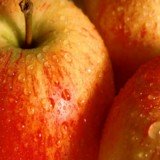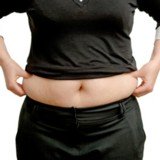Eating Healthy On A Budget
Eating Healthy On A Budget Tips and Diet
 For a lot of the ordinary folk, saving money is one of the things that are on the top of their lists. With so many responsibilities, from mortgage to bills to the children and food for the house, the pressure can be quite intense. There are so many ways in which we can save a dollar, two or more with our food bills. Eating healthy is one of the things that many people across the globe are yearning to do. This is not surprising seeing as there have been many cases of obesity on the rise in the past 20 years. One of the causes of this prevalence in obesity has been due to an increase in food serving sizes, not only at the fast food outlets but also in our own homes.
For a lot of the ordinary folk, saving money is one of the things that are on the top of their lists. With so many responsibilities, from mortgage to bills to the children and food for the house, the pressure can be quite intense. There are so many ways in which we can save a dollar, two or more with our food bills. Eating healthy is one of the things that many people across the globe are yearning to do. This is not surprising seeing as there have been many cases of obesity on the rise in the past 20 years. One of the causes of this prevalence in obesity has been due to an increase in food serving sizes, not only at the fast food outlets but also in our own homes.
Many people are looking for ways to make their allocated funds for food stretch and still lead a healthy eating lifestyle. With a little knowledge and planning healthy eating on a budget is certainly achievable. Budget eating but in a healthy way is a lot easier than you may have imagined. For a lot of people, it seems as a far fetched thing that only those with money can do! But we're here to prove that it's not so! With some tips, hints and ideas, you also can be eating healthy without breaking the bank :).
- Tip #1: Make a budget for food and try as much as you can to stick to it. This can be a daily, weekly or monthly budget, whichever suits your situation. For example, in some developing countries, they can survive on something as little as three American dollars a day and still have at least two healthy meals in that day! In such situations, they are obviously not buying any fast food, hence the US$3 can work out fine for them.
- Tip # 2
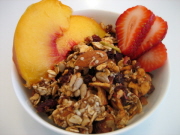 : Plan your meals and snacks, yes snacks too! It's important to take time out, sit and check how you spend your money when it comes to food. You can save quite a bit by cutting down on junk food, eating out less and creating a grocery list (we will discuss this a little more further down). Try and avoid by all means unhealthy snack options which most of the times are empty calories. This means they are loaded with calories and contain little to no nutritional benefits. Examples include soda pops, chips and the like. Another thing, plan your meals with what you have at home. Be innovative and creative in your cooking.
: Plan your meals and snacks, yes snacks too! It's important to take time out, sit and check how you spend your money when it comes to food. You can save quite a bit by cutting down on junk food, eating out less and creating a grocery list (we will discuss this a little more further down). Try and avoid by all means unhealthy snack options which most of the times are empty calories. This means they are loaded with calories and contain little to no nutritional benefits. Examples include soda pops, chips and the like. Another thing, plan your meals with what you have at home. Be innovative and creative in your cooking. - Tip #3: Don't throw away leftovers. This has to be one of the most common tips on eating healthy on a budget. Leftovers, as I'm sure you already know, can be turned into a healthy, scrumptious meal. You can easily soup, stew, stir-fry or even burrito them! Once again, you have to be creative.
- Tip # 4: When you go shopping, make a grocery list and try by all means to stick to it. As mentioned earlier, this helps to cut out impulse buying which is definitely not so healthy for your pocket. Also when you go shopping, it's advisable to shop around first before settling on one specific store, supermarket or shopping mart. You will be surprised what good deals you can get. The next following tips will be stemming from this one.
- Tip# 5
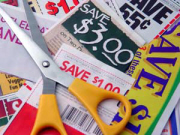 : Use coupons and buy generic brands. When you shop, look for specials and in-store sales. Store or generic brands usually cost less. However, some store brands may lack in quality whilst some may be the same as your favorite brands. Coupons, although they may take up a lot of time to cut up and collect, can save you quite a bit of cash. This is one of the ways that eating healthy on a budget can be achieved.
: Use coupons and buy generic brands. When you shop, look for specials and in-store sales. Store or generic brands usually cost less. However, some store brands may lack in quality whilst some may be the same as your favorite brands. Coupons, although they may take up a lot of time to cut up and collect, can save you quite a bit of cash. This is one of the ways that eating healthy on a budget can be achieved. - Tip # 6: Buy from your local farmers' market. Eating healthy on a budget doesn't get any easier than this. You get great deals from the farmers' market. Not only will the food be fresh, but most is being grown organically now, which has greater benefits (we will also look into this a little further down). You will also get your produce at slightly lower prices and save quite a bit of money and still eat healthy at the same time. So don't be embarrassed to be seen at the local farmers' market! Your body and wallet or purse will thank you!
- Tip # 7
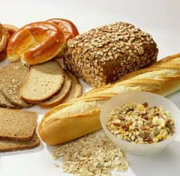 : When buying carbs, whole grain foods are best. Carbohydrates are an important part of our diet. It is however important to buy whole grains where possible. They are nutritionally more loaded than their refined counterparts. Some of the whole grains may be a little more pricey, making eating healthy on a budget a bit difficult. But if you combine all the tips here, you may be able to get away with it. A few examples of whole grain foods include brown rice, whole wheat or whole grain pasta, bread, cereal, etc. Oatmeal is one of the best cereals that you can choose. Not only does it cost less but it also has amazing health benefits and has longer shelf life.
: When buying carbs, whole grain foods are best. Carbohydrates are an important part of our diet. It is however important to buy whole grains where possible. They are nutritionally more loaded than their refined counterparts. Some of the whole grains may be a little more pricey, making eating healthy on a budget a bit difficult. But if you combine all the tips here, you may be able to get away with it. A few examples of whole grain foods include brown rice, whole wheat or whole grain pasta, bread, cereal, etc. Oatmeal is one of the best cereals that you can choose. Not only does it cost less but it also has amazing health benefits and has longer shelf life. - Tip # 8: When it comes to your sources of protein, i.e. meat, eggs, dried beans, fish, etc; it's a great idea to buy your meat in bulk and then split it into smaller packs enough for a single meal and freeze them. This proves to be cheaper in the long run. Also in your buying, if you want to eat healthy, it's better to buy the lean cuts of beef and skin your white meats (chicken, turkey). It's also good to try other sources of protein also such as lentils, nuts and seeds. Beans in particular are a great and cheaper source of protein. They are also quite easy to prepare. With a vast variety of beans such as kidney beans, dry beans, sugar beans, baked beans, garbanzo beans, etc. you surely can find a favorite from them all.
- Tip # 9: Buy fruits and vegetables that are in season. Frozen produce can sometimes be a bit more pricey than fresh fruit and vegetables in season. However, should you want to buy frozen produce, you may do so if the fresh produce appears to be more expensive. Usually this happens when the particular fruits or veggies are not in season. Canned fruits are also another option that you may go for. The only problem with these is that they tend to contain quite a bit of sodium. Too much sodium in one's diet can bring about undesirable health problems such as hypertension. To escape this, you can drain and rinse canned vegetables before use to reduce the salt content.
- Tip # 10
 : When buying dairy products, opt for the low-fat products. These may include low-fat milk, low-fat yogurt and cheeses. As for the sweets, oils and fats part of the food pyramid diagram, these are to be eaten sparingly. Eating healthy does not necessarily mean you cannot have the sweet things brushing against your palette!
: When buying dairy products, opt for the low-fat products. These may include low-fat milk, low-fat yogurt and cheeses. As for the sweets, oils and fats part of the food pyramid diagram, these are to be eaten sparingly. Eating healthy does not necessarily mean you cannot have the sweet things brushing against your palette!
However, moderation is an important key here. And if your plan is to be eating on a budget and still enjoy things such as dessert, you most certainly can still do so. Treat yourself to some dessert. You can try things such as fresh fruit salad, home-baked treats and 100% fruit juice popsicles. Again, creativity will be needed here.
Eating Healthy On A Budget To Lose Weight
Eating healthy on a budget to lose weight may appear to be a tricky thing to do. However, it can be done. The tips above can still be applied to your eating healthy on a budget diet. In addition to those, you should also;
- Eat out less. One of the things that blow up our food budgets is eating out just about everyday of the week. One of the other problems with this apart from your wallet is your health. When we go out to the fast food outlets, we are dashing for the unhealthy meal options. Hence, the increase on the waistline. If you want to lose weight it's better you choose the healthier meal options such as salads and meats that haven't been deep-fried.
 Cook at home more often. You will be surprised just how much you will save and the great thing about cooking for yourself is that you are in charge of the preparation method. This means you could either boil, bake, grill, broil or stir-fry your chosen meals. You will know exactly what you are putting into your plate. You're in charge of the recipe.
Cook at home more often. You will be surprised just how much you will save and the great thing about cooking for yourself is that you are in charge of the preparation method. This means you could either boil, bake, grill, broil or stir-fry your chosen meals. You will know exactly what you are putting into your plate. You're in charge of the recipe.- Practice portion control. This has really become a problem in this day and age. With the introduction of the double-cheeseburgers, triple-baconator, max cola and so on and so forth, people are taking in more than they really need. Eat only what your body needs and don't fall for the "double for your money" lines at the fast food outlets. Even at home, manage your portions.
- And finally, when eating healthy on a budget, choose healthier snacks such as nuts, fruits and vegetables. They can keep you feeling satiated for longer and with less calories too and great nutritional benefits.
Eating Healthy On A Budget In Conclusion
As we said in the beginning, with knowledge and planning, eating healthy on a budget can be attained. Have more of the good carbohydrates, i.e. whole grains, fruits, vegetables, beans, etc. They are also known as the healthy carbohydrates. This is because your body digests them slowly, providing you with energy that lasts longer. They also keep your blood sugar and insulin levels stable. The "bad" carbs on the other hand only provide short-lived energy, are digested quickly and cause spikes in blood sugar levels. A few examples of these unhealthy carbohydrates include refined, processed foods such as white rice, white bread and white flour.

